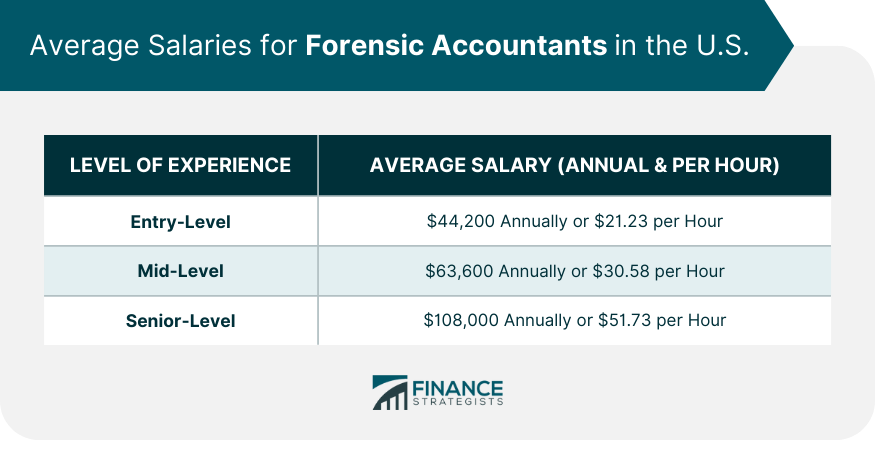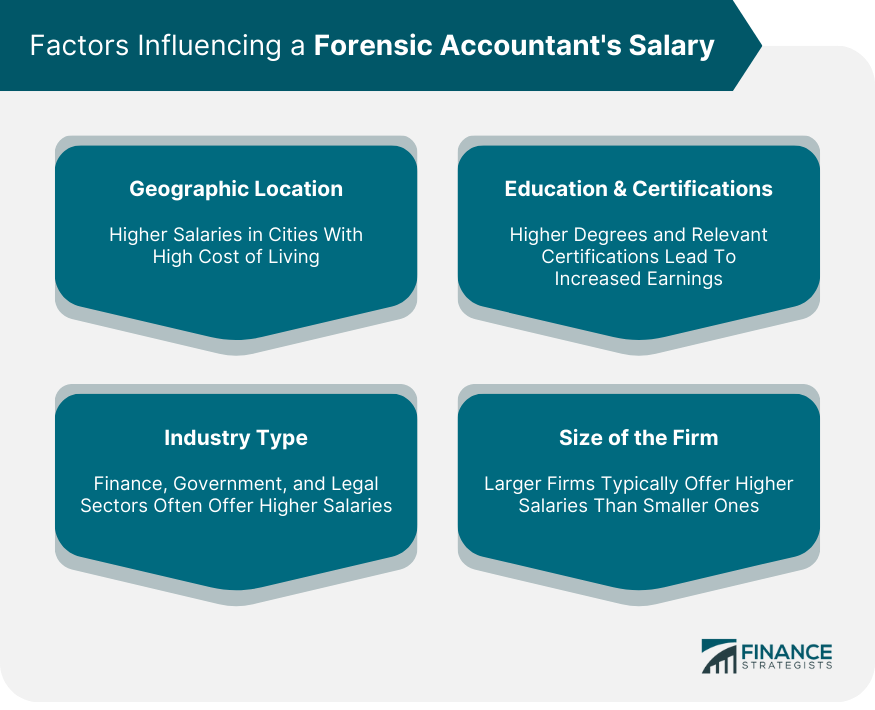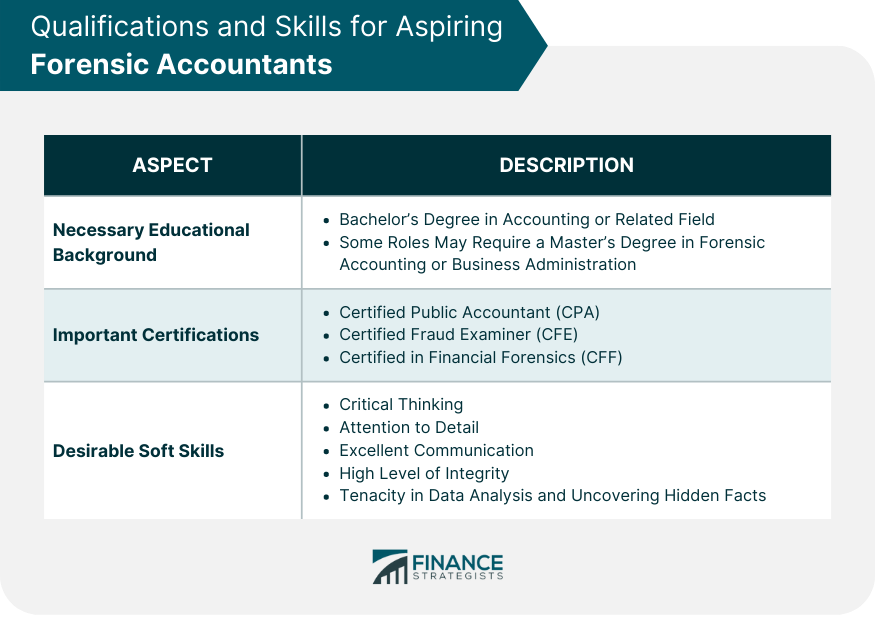Forensic accounting encompasses a unique blend of detective work and financial acumen. It involves the use of accounting skills to investigate fraud, embezzlement, and other irregularities hidden in financial transactions. Often, their work is used in legal proceedings or disputes. This has increasingly become a critical field in modern business environments. As business operations become more complex, the risks of fraud, financial misrepresentations, and other unethical activities rise. Forensic accountants provide an invaluable service by uncovering these issues, safeguarding businesses, and ensuring legal compliance. As of 2024, entry-level forensic accountants can expect to earn an average salary of $44,200 annually or $21.23 per hour. However, these numbers can significantly vary based on location, industry, and the size of the hiring organization. Forensic accountants with a few years of experience under their belt, usually between 3-6 years, can expect to earn substantially more. The average salary for mid-level forensic accountants is $63,600 annually or $30.58 per hour. Gaining specialized certifications like Certified Fraud Examiner (CFE) or Certified in Financial Forensics (CFF) could also boost earning potential at this stage. Senior forensic accountants or those in leadership roles boast even higher earnings. With more than seven years of experience, professionals in this category typically earn $108,000 annually or $51.73 per hour, depending on their specialization and the complexity of the cases they handle. Location is a significant factor in salary determination. Forensic accountants based in cities or states with a high cost of living, like New York or California, usually earn more than their counterparts in regions with a lower cost of living. Higher education degrees, such as a Master's in Accounting or Business Administration, and professional certifications, like the CFE or CFF, can significantly influence a forensic accountant's salary. These qualifications not only enhance the professional's credibility but also increase their knowledge base, making them more valuable to employers. The industry a forensic accountant works in can also impact their salary. For example, those working in finance and insurance sectors, government agencies, or legal services often earn more than those in less lucrative industries. The size and financial power of the employer play a role in salary packages. Large multinational corporations typically offer higher salaries than smaller firms. However, smaller firms might provide quicker advancement opportunities. When compared to traditional accountants, forensic accountants tend to earn a higher average salary. The median salary for a general accountant is $58,336 annually. However, as mentioned earlier, experienced forensic accountants can earn well over this average due to their specialized skill set and the complex nature of their work. Financial analysts, on the other hand, have a median income similar to that of forensic accountants, which is $87,027. However, the highest earners in forensic accounting outstrip their counterparts in financial analysis, making the field financially rewarding for those with the necessary skills and experience. Forensic accountants have a clear path to career advancement. Typically, they start as associate accountants and move up to become senior forensic accountants, managing teams and handling intricate and high-profile cases. With further experience and expertise, they can rise to executive-level positions, like Chief Financial Officer (CFO) or partner in an accounting firm. Forensic accountants are in high demand in several sectors. They are especially sought after in the financial services sector and governmental organizations where there is a high risk of financial misconduct. Other sectors include insurance companies, law enforcement agencies, and large corporations. The advent of technology has resulted in a surge in demand for forensic accountants. With an increasing number of financial transactions being conducted digitally, the risk of cyber fraud and other digital financial crimes has spiked. Consequently, forensic accountants with a strong understanding of these technologies and their associated risks are highly valued in the marketplace. To become a forensic accountant, one must have a strong foundation in accounting, typically obtained through a bachelor's degree in accounting or a related field. Some roles may require a master's degree in forensic accounting or business administration with a focus on accounting. Certifications enhance a forensic accountant's credibility and marketability. The most commonly recognized certifications include Certified Public Accountant (CPA), Certified Fraud Examiner, and Certified in Financial Forensics. Beyond technical knowledge and certifications, forensic accountants need certain soft skills to excel. These include critical thinking, keen attention to detail, excellent communication skills, and a high level of integrity. They also need the tenacity to dig deep into financial data and uncover hidden facts, a trait that is at the heart of their role. Forensic accountants play a vital role in today's complex business landscape. Their expertise in auditing, taxation, and consultation is indispensable for safeguarding businesses from financial irregularities and ensuring legal compliance. When it comes to salaries, their earning potential increases significantly with experience and specialized certifications. Factors such as location, education, industry, and employer size influence their income. Compared to traditional accountants, forensic accountants tend to earn higher salaries, and they often outpace financial analysts in terms of the highest earners. Their career growth prospects are promising, with opportunities for advancement to executive-level positions in various sectors. The evolving technological landscape has led to a surge in demand for forensic accountants, making their understanding of digital financial crimes and technology an essential skill. Aspiring forensic accountants should focus on gaining a strong educational background and relevant certifications and cultivating vital soft skills like critical thinking and attention to detail. Brief Overview of Forensic Accounting
How Much Do Forensic Accountants Make?
Average Salaries for Forensic Accountants in the U.S.
Entry-Level Positions
Mid-Level Positions
Senior-Level Positions

Factors Influencing a Forensic Accountant's Salary
Geographic Location
Level of Education and Certifications
Industry Type
Size of the Firm

Comparison With Other Accounting Professions
Salary Comparison: Forensic Accountants vs Traditional Accountants
Salary Comparison: Forensic Accountants vs Financial Analysts
Career Growth and Opportunities in Forensic Accounting
Promotions and Career Advancement
High-Demand Sectors
Impact of Technology on Forensic Accounting Opportunities
Qualifications and Skills for Aspiring Forensic Accountants
Necessary Educational Background
Important Certifications
Desirable Soft Skills

Bottom Line
How Much Do Forensic Accountants Make? FAQs
The average salary of a forensic accountant in the U.S. varies with experience. Entry-level positions start from $44,200 annually or $21.23 per hour. With experience, the salary can go up to $108,000 or $51.73 per hour.
Forensic accountants usually earn higher average salaries than traditional accountants due to their specialized skill sets and the nature of their work.
Several factors influence a forensic accountant's salary, including their level of experience, educational background, certifications, geographic location, the industry they work in, and the size of the hiring organization.
Important certifications such as Certified Public Accountant (CPA), Certified Fraud Examiner (CFE), and Certified in Financial Forensics (CFF) can significantly enhance a forensic accountant's salary.
Yes, forensic accountants are in high demand, especially in sectors such as financial services, governmental organizations, insurance companies, law enforcement agencies, and large corporations.
True Tamplin is a published author, public speaker, CEO of UpDigital, and founder of Finance Strategists.
True is a Certified Educator in Personal Finance (CEPF®), author of The Handy Financial Ratios Guide, a member of the Society for Advancing Business Editing and Writing, contributes to his financial education site, Finance Strategists, and has spoken to various financial communities such as the CFA Institute, as well as university students like his Alma mater, Biola University, where he received a bachelor of science in business and data analytics.
To learn more about True, visit his personal website or view his author profiles on Amazon, Nasdaq and Forbes.











